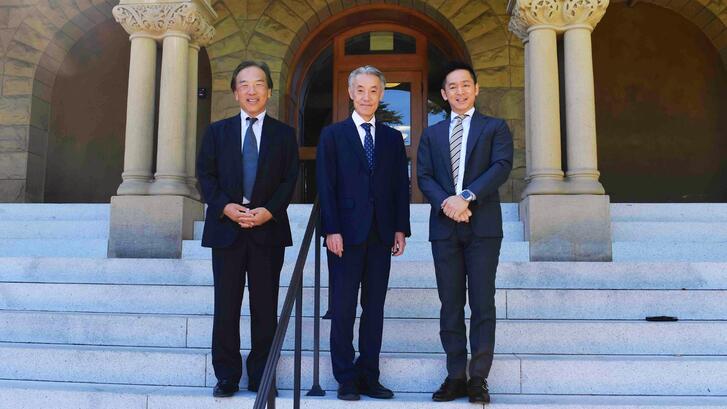Asahi Shimbun GLOBE+ Spotlights Stanford Japan Barometer’s Latest Findings on Marital Surname Choices
The Stanford Japan Barometer (henceforth SJB), a public opinion survey on various topics including Japanese society, politics, and economy, is led by Stanford sociologist Kiyoteru Tsutsui, the deputy director of Shorenstein APARC and director of the Center’s Japan Program, and political scientist Charles Crabtree of Dartmouth College. SJB is one of the largest online surveys of its kind in Japan.
In fall 2024, SJB conducted a survey on gender and sexuality, including on the topic of optional separate surnames for married couples, as the LDP presidential election reignited the debate about this issue in Japanese society. SJB previously conducted a similar survey on the topic in 2022. Surname selection has also reemerged as a policy issue due to the growth of the opposition to the ruling LDP in the October 2024 subsequent general election for the Lower House of the National Diet (Japan's Parliament).
Below is an English translation of a recent GLOBE+ feature story on SJB's latest survey that sheds light on Japanese voters' views on this issue. This is the fifth installment in a series GLOBE+, an international news outlet run by the Asahi Shimbun, is publishing jointly with APARc’s Japan Program on SJB's work. You can read an English translation of parts 1-3 and part 4 in the series. The translation was initially generated via DeepL. The following translation was edited for accuracy and style.
Sign up for APARC's newsletters to receive our scholars' research updates >
Views on a Dual-Surname Option for Spouses
The issue came into renewed focus when former Environment Minister Shinjiro Koizumi, one of the candidates in the LDP presidential election held in September 2024, pledged to implement a selective married couple surname system. SJB therefore conducted another survey from September 25 to October 2, 2024, on the same themes as those used in the November 2022 survey on selective surname system, same-sex marriage, female Diet members, and outside directors. There were 9769 respondents, a little more than 1,000 more than in the previous survey.
The Japanese government has regularly been surveying this issue but as a result of changing the survey questions and the way they were asked between 2017 and 2021, support for the selective surname system dropped from a record high of 42.5% in the 2017 survey to record low of only 28.9% in 2021. For that reason, in SJB’s November 2022 survey and fall 2024 survey, respondents were randomly assigned to either of the two methods of asking questions from the government's 2017 and 2021 surveys.
The results showed that, among respondents assigned to the 2021 method, 26% preferred to “maintain the current system of married couples with the same family name,” 38% preferred to “maintain the current system of married couples with the same family name and establish a legal system for the use of the maiden name as a common name,” and 36% preferred to “introduce an optional system of married couples with different family names.”
On the other hand, among those assigned to the 2017 system, 21% said that “married couples should always take the same surname as long as they are married, and there is no need to change the current law,” 59% said that “if a married couple wishes to take the surname they had before their marriage, it would be acceptable if the law is changed to allow each couple to take the surname they had before their marriage,” and 20% and 20% said "Even if married couples wish to keep their maiden surnames, they should always have the same surname, but I don't mind changing the law to allow people who change their surnames due to marriage to use their maiden surnames as aliases.” In other words, 59% favored optional separate surnames for married couples.
Thus, the 2021 method of asking the question was more likely to result in fewer people supporting selective married couples. This is similar to Japan Barometer's previous 2022 survey, and it can be said that the government's 2021 survey showed less support for selective surnames because of the change in the framing of the survey questions.
As in the 2022 survey, SJB asked about optional separate surnames for married couples under certain assumptions, so as to reveal under what conditions public opinion would be swayed toward selective surnames. In SJB’s 2022 survey, respondents’ opposition was strongest when the precondition suggested separate surnames could weaken family ties or harm children and society. In the latest survey of fall 2024, however, no statistically significant causal relationship was observed, suggesting that public opinion on this issue has matured and no longer changes even when preconditions are added.
Furthermore, the 2024 survey introduced a new question about whether individuals would prefer to retain their maiden name if a dual-surname option for spouses was allowed. Among female respondents, 21.3% said they would “likely choose to do so,” 23.5% were “undecided,” and 55.2% said they “would not likely choose to do so.”
Commenting on these findings, Professor Tsutsui said: “Many older individuals and already-married women are accustomed to the current system, making it unlikely they would opt for separate surnames. The fact that only about 20% of the respondents would choose to change their surname could be a basis for some kind of legislation, since 20% of women feel inconvenienced. Furthermore, since the majority of women do not choose to have separate surnames, it is unlikely that the family system will collapse rapidly, as some conservatives worry. This may be a result that encourages the implementation of legal reform.”
Attitudes Toward Gender Equality
The survey also explored attitudes toward women’s advancement in society. As in the 2022 survey, respondents evaluated hypothetical political candidates for the Diet based on six attributes: age (from 32 to 82 in 10-year increments), gender, marital status, number of children, level of education, and professional background (10 types, including Ministry of Finance, Ministry of Economy, Trade and Industry, and Ministry of Foreign Affairs bureaucrats, corporate executives, governors, and local assembly members).
Two “candidate images” were created by randomly combining six attributes, and the respondents were asked to choose one in a two-choice format. The same question was repeated 10 times with different choices, and the responses obtained from all survey targets were tabulated and analyzed. The reason for the complexity of the method is that, from a statistical point of view, this allows the researchers to get closer to the “true feelings” (public opinion) of the respondents.
The combination of attributes that received the most responses, i.e., the “ideal candidate image” in respondents' minds, was the same as in 2022: female gender, ages 32 and 42, and occupation as governor or corporate executive. This aligns with the findings from the 2022 survey, indicating strong expectations for female leaders in their 30s and 40s. Indeed, Japan’s October 2024 Diet election mirrored these results, with a record 15.7% of women elected.
Views on Same-Sex Marriage
In addition, support for same-sex marriage remained high overall, with 43.7% in favor, 38.9% neutral, and 17.3% opposed. Support for same-sex marriage increased most when the following preconditions were added: "From the standpoint of human rights and gender equality, it is unfair to not recognize same-sex marriage," and "For gay people, not having their marital relationship recognized causes various inconveniences, such as inconveniences and disadvantages in their professional and daily lives, and a sense of denial of their identity."
On the other hand, when members of Parliament and outside directors were asked about their preferred combination of attributes, the least supported of the attributes of marriage was “people in homosexual relationships.”
“Married” was the most popular, as were “never married” and “divorced,” with the least support for those in a homosexual relationship.
“While there is a growing understanding of same-sex marriage in the private sphere, there seems to be a tendency for people to choose those who are within the traditional family system for roles holding public responsibility,” said Tsutsui.
Read More
Approximately 20 percent of Japanese women are likely to choose a different surname if a dual-surname option for married couples is introduced, according to the latest survey of the Stanford Japan Barometer. A new installment in the Asahi Shimbun’s GLOBE+ series features these and other Japan Barometer survey results.


















